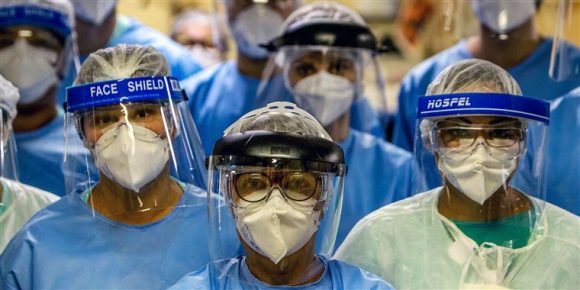This week on Swarfblog, we’re sharing a timely guest post by US veteran and B2B marketing expert, Chad Storlie. Chad discusses the similarities he sees between combat veterans and the nation’s healthcare workers, and offers encouragement and advice to strengthen their resolve. Read on:
Imagine going to work each day armed with the best colleagues, the best technology, the best training, and the best education to battle a resilient, ever present, and capable foe. You do your best and people still die. Wake up the next day, do your best, people die. Then repeat, repeat, and repeat.
Healthcare workers are learning in a COVID-19 world what combat veterans have struggled with for an eternity. What if you do your best and it is not enough? What if you do your best and you fail?
The problems, frustrations, and despair that healthcare workers are experiencing fighting COVID-19 and the maelstrom of secondary effects on patients are disheartening and all too familiar for combat veterans. Trapped in sweated soaked protective equipment, lacking mission critical supplies, cut off from friends and family, fighting a changing foe that is everywhere and nowhere, and working incredible hours without end. This could be Balad, Brooklyn, Fallujah, or Detroit. Counterinsurgency and COVID-19 too often follow the same challenges.

I am a small “c” combat veteran. A small “c” for combat because I only did a year in Iraq and a little less than two years in post-war Bosnia helping that country pull itself out of a genocidal, killing frenzy. My peers did 6, 10, and 12 combat deployments between Iraq, Afghanistan, and other locations across the globe. Combat veterans need to pass our emotional learning onto the country’s new front line soldiers, healthcare workers.
Combat veterans need to express to healthcare workers that effort, caring, attitude, and resolve matter most when they seemingly matter not at all. One of my most difficult days in Iraq highlighted a massive car bomb that blew up at the provisional United Nations compound with an understanding that none, none of our massive web of ongoing intelligence operations detected the plan. On one of my worst days, I got back to work and tried again to do my best work.
In Special Forces training, the mantra of “Do the Best You Can” rings through every operation, every class, and every Special Forces instructor. Doing the best fully acknowledges that difficult, seemingly impossible, mission sets are the part and parcel of a Special Forces life. The key part for Special Forces is that no matter the conditions, you do your best, and you do your best again and again no matter the conditions.
Combat veterans knew that to win we needed to go out and do our best every day, to help and keep faith with our fellow soldiers, and to always, always come back the next day willing to lead, willing to keep improving, and willing to keep believing that we would be successful.
Whether combat or COVID-19, I want the healthcare front line to believe in themselves, believe in their training, and believe in their ability to win. I know that the true results of their efforts may be years away, but their daily efforts contribute to the coming victory.
Question: What have you been able to do to help people during the COVID-19 crisis?
Chad Storlie is a retired US Army Special Forces officer, an Iraq combat veteran, and has 15 years university teaching experience as an adjunct Professor of Marketing. He is a mid-level B2B marketing executive and a widely published author on leadership, business, data, decision making, military and technology topics.

3 Comments
Been able to do quite a bit
Helped many meat packers change their packaging from restaurant to retail
Made molds to package 3″ swabs for the tests (though they wont be able to touch the back of your head through your nose with them)
Made seal plates for plasma bags
Currently working on slitting for a machine to make pouches to sterilize N95 masks
Certainly doing more than we were last year at this time
Will do more in short order if it helps win the battle
Wonderful piece. Lloyd, you need to have Mr. Storlie write again.
And thank you, Mr. Storlie for your service! Even with one sortie in the “Sand Box” makes you a hero!